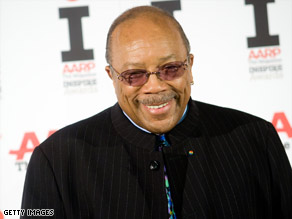Quincy Jones feels like he's 'just starting'
- Story Highlights
- Quincy Jones' new book is coffee-table tome showcasing life, memorabilia
- At 75, Jones as active as ever: new album, restaurant among projects
- Composer, producer wants to push national arts minister
- Next Article in Entertainment »
CNN
(CNN) -- If there's one thing Quincy Jones can't stand, it's people without a sense of history.

Music producer and composer Quincy Jones says he wants to encourage arts education in the United States.
Particularly musical history.
"I was in Seattle about a month ago, and I asked a kid [at a local high school], 'What do you think about Louis Armstrong?' And he said, 'I've heard the name,' " Jones says in a phone interview from Washington, D.C. "I said, 'What do you think about Duke Ellington and Charlie Parker and Coltrane?' He said, 'I've never heard of them.'
"And that hurts me a lot. Because it's easier to get where you're going if you know where you came from."
Jones, who was in Washington to accept yet another honor in a life that's been filled with accolades -- in this case, an Inspire Award from AARP The Magazine for his work as a poverty fighter -- knows exactly how he got to be where he is. The producer, composer, arranger and music industry eminence grise has made versatility and hard work his life's guiding principles.
When he was 14, Jones met a 16-year-old Ray Charles. By the time Jones was 18, he was playing in Lionel Hampton's band.
QUINCY JONES ...
He produced Lesley Gore's hit records, including "It's My Party," and arranged for Count Basie and Frank Sinatra. He was nominated for an Oscar for his "In Cold Blood" score (one of seven Academy Award nominations), wrote music for "Roots" and then produced Michael Jackson's "Off the Wall," "Thriller" and "Bad."
All this and charitable work through his Quincy Jones Foundation.
Even today, at 75, he has a number of projects brewing, including a miniseries on Armstrong, a film on Brazil's Carnival, a Tony Bennett-Stevie Wonder duets album and an entry in Las Vegas, Nevada's restaurant business.
One look through Jones' new book, "The Complete Quincy Jones: My Journey & Passions" (Insight Editions), shows how Q -- the nickname Sinatra gave him -- found his way. ![]() See some of the season's other great coffee-table books »
See some of the season's other great coffee-table books »
The book, which arrives seven years after Jones' revealing autobiography, is practically a Q scrapbook. There's a photo of Jones recording Dinah Washington; a copy of the lead sheet of "We Are the World"; a map of Jones' exhausting trip through Europe in 1960, a tour that left him almost $150,000 in debt.
The material is richly packaged and cleverly designed, with some in the form of replicas of record covers and correspondence.
Ironically, given his sense of history, it wasn't Jones who saved this treasure-trove. He gives credit to his brother and sister-in-law, who "saved everything."
"I used to write a log every day when I was starving to death in New York in the early '50s -- every little arrangement, because we were surviving on that," he says. "They had all of that material. I had no idea they saved all that. I move too fast to do all that," he laughs.
But he remains passionate, particularly about music and history. He has hopes Barack Obama will appoint a secretary of the arts. "Our music is the most widely imitated music on the planet, and we're the only country without a minister of culture. ... All over the world they understand our music better than we do."
Don't Miss
For his part, he's doing the best to pass on his knowledge -- and keep moving. Looking at "The Complete Quincy Jones," he says, was eye-opening.

"It startled me. It still does. [You look at the index], and you say, how did all this happen? ... It's an astounding experience.
"And what's strange about it," he adds, "is I feel like I'm just starting."
All About Quincy Jones • Frank Sinatra • Music

 Sit tight, we're getting to the good stuff
Sit tight, we're getting to the good stuff